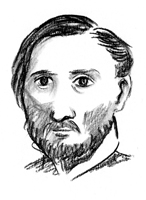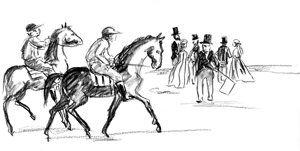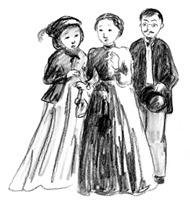Mira's Diary (6 page)
Authors: Marissa Moss


I still hadn't kissed Claude. Or I should say, he hadn't kissed me. I still hadn't found Mom. I still didn't know what job I was supposed to do or why Mom was so scared.
What I had done was gotten to know Mary Cassatt and Degas a lot better. Yesterday when I was at Degas's with Mary, a painter named Renoir came by with some sketches he wanted to show his friends. He was a small man with quick, bird-like motions and round dark eyes. I thought since his art was soft and sweet, he would be too, but he was nervous and fidgety, laughing in sharp barks, talking so fast I could barely understand him, even when he spoke English.

“I am thinking of traveling to Algeria, Degas. You should come with me. Think of the colors we'd see.”
“Algeria?” asked Mary. “Why Algeria?”
“I bet I can guess,” said Degas. “You want to paint the same kind of brilliant watercolors Delacroix did.”
Renoir yipped a short laugh. “Exactly! I fear painting in Paris is turning my colors to sugar. It's all too sweet here. I need the glaring southern light, the dark-skinned Algerian beauties instead of all these creamy pale French women.”
“In your hands, it'll all turn to pastry,” Degas said. “You can't help yourself.”
“Mary, you come with me then, since Edgar will not.”
“I'm tempted,” Mary said. “But since my sister isn't well, I don't want to go far.”
“What is wrong with your sister?” I asked, then immediately felt I'd been rude. “I mean, if you don't mind saying.”
“No, no, it's kind of you to ask. She has a weak constitution and always seems to be sick with something. Nothing serious, though, I'm sure.”
“You must make sure she stays warm,” said Degas, leaning forward to take Mary's hand. “The Paris chill can creep into your bones. Perhaps you should take her to sunny Algeria with Renoir.”
“Yes!” crowed Renoir. “That will make us all happyâme, you, and your dear sister.”
“I wish I could go!” I blurted out. Why did I keep saying things I regretted?
“You are welcome too, of course,” said Renoir. He hadn't paid much attention to me before but now he beamed at me. “Perhaps I could paint you. You have a dark, olive skin, almost Algerian. You would make a splendid model!”
I could feel my checks turn hot and red. Posing for an artist, even a famous one like Renoir, sounded totally embarrassing. Besides, I wanted to do the drawing, not be drawn.
“Don't tease her like that, Renoir,” Mary chided. “You're tormenting the poor child. Come, Mira, I think it's time for us to go. And not to Algeria.”

Besides Renoir, I've met ballet dancers, café singers, and one of Degas's closest friends, Ludovic Halévy. Who is Jewish! That meant Degas didn't think of me as a token Jewish friend, and he couldn't be that anti-Semitic. Degas had known Halévy since they went to school together, and he ate dinner with the whole family once or twice a week.
He doted on their children and stayed at their country homes, and Halévy's wife developed his photographs. (Degas is really into the new art of photography. I couldn't help thinking how much Dad would love to meet him.) Degas had many friends, but nobody was as close to him as the Halévys. Mom's note had said to keep an eye out for intolerance so I was relieved that I didn't have to think of Degas as prejudiced against Jews anymore. I could just enjoy him as a friend.

Today we went to the races. Degas sketched the horses; Claude sketched the crowds; and I sketched it allâhorses, people, Degas, and Claude. Mary Cassatt loaned me a parasol and dress since I only had one, and I felt elegant with my hair pinned up and white silk gloves making my fingers look tapered and slender.
“Don't move. Stay just as you are,” Claude said.
“You're drawing me?” My cheeks flamed.
“You're the most lovely thing here. How can I resist?”
I lowered my eyes. If that was true, why hadn't he kissed me yet? I'd given him so many chances.
“Are you an artist now?” I asked instead. “Not just an artist's assistant?”
“I am trying to be an artist,” Claude corrected. “Which is why I am an artist's assistant. Who better to learn from than Degas? And I saw you sketching yourself, so you too, are an artist.”
“No,” I said. “I was taking notes, that's all. Things that pop into my head. It's kind of a hobby, I guess.” I gripped my sketchbook tightly.
His fingers moved quickly over the paper. The rasp of chalk on paper, horses snorting, hooves drumming on the dirt track, people murmuring and cheeringâI let the sounds wash over me, along with the lemony sunlight and the grassy breezes. It was a perfect moment. Time could stop right now, I thought, and I'd be happy like this.

But of course time doesn't stop. It moves, backward I suppose as well as forward, but it moves. I began to wonder if Mom was still in this time and place. And if she was, what was she doing here? More importantly, what was I doing here? And when would we both go home? Paris was beautiful, but I missed Dad and Malcolm. And as nice as everyone was to me, I didn't belong here. I wanted to click my heels together like Dorothy in
The
Wizard
of
Oz
and magic my way home again.
I could feel tears of homesickness prick my eyesâand that's when I saw her, with my vision blurred by tears. It was Mom, there in front of me for real! I wanted to rush up and hug her, hold her tight so she couldn't get away, but I was afraid she'd run away again. Maybe if I came up slowly and quietly, the way you try to get close to a wild animal?
I stood watching her, trying to figure out what to do. She walked alongside the track in a melon-colored dress, her arm linked with that of another woman wearing lilac. A man in a military uniform stood at the lilac woman's side, the three of them forming a tight group. They were too far away for me to tell much, except that Mom was talking and the man was leaning toward her, listening intently, while the lilac woman looked horrified by whatever Mom was saying.

Scarier was the woman I saw behind them. It was the beautiful creepy woman, the witch from Notre Dame. She looked ready to claw out Mom's eyes. Now I had no choice but to go to Mom, no matter what the rules said.
“I'm sorry, Claude,” I said. “I'll pose for you later.” I gathered up my skirts, trying to stride quickly toward Mom. When she saw me, she shook her head, her eyes warning me off.
That didn't stop me. “Excuse me, madame,” I said. “You should be careful. There are pickpockets all around, and I recognize a particularly nasty one behind you.”
Mom turned pale and nodded. Glancing back at the dark-haired woman, she hurried away with the couple. I lunged toward the woman, not sure if I should trip her or try to throw her to the ground like a football tackle. I just knew I had to stop her.
I snapped my parasol shut, thinking I could use it as a weapon somehow. What I really wanted was some holy water. I should have taken some from the font at the front of Notre Dame. I imagined tossing the water on the beautiful nasty woman and watching her melt into the ground like the Wicked Witch of the West.
“There you are!” she barked, grabbing my wrist with that iron grip of hers. “You naughty girl! I didn't say you could have today off.”
“I'm not your maid!” I tried to wrench free but I swear her hands were like the talons of an eagle.
“You're coming home where you belong!” she seethed. Her eyes drilled into me. I didn't know someone so beautiful could be so ugly.
“Get away, you crazy old bag!” I whacked her with the parasol, hitting as hard as I could.
Claude rushed up. Even if he thought I was crazy for beating on an elegant lady, I had to give him credit. He took my side right away. He pulled the woman off me, trying to be a gentleman at the same time.
“Madame has made a mistake, it seems. This young lady is not your servant, and you will leave her in peace.” It wasn't a question.
The dark woman glared. She must have been used to men fawning over her, so why wasn't Claude? Then she smiled and her face was serenely beautiful again. “Ah, a mistake. Must be a trick of the light. No harm done, I'm sure.”
